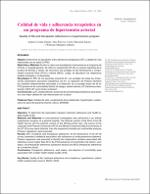Calidad de vida y adherencia terapéutica en un programa de hipertensión arterial
Related Resource(s)
https://revistas.unal.edu.co/index.php/revsaludpublica/article/view/88007Date
2020-11Author(s)
Lozada Zapata, Andrea
Piscoya, Julio
Shiraishi-Zapata, Carlos
Mendieta Albañil, Wilfredo
Metadata
Show full item recordAlternate title
Quality of life and therapeutic adherence in a hypertension program
Abstract
Objetivo Determinar la asociación entre adherencia terapéutica (AT) y calidad de vida relacionada con la salud (CVRS).
Materiales y Métodos Se llevó a cabo una investigación transversal en el programa de HTA de un hospital general. Se utilizó el cuestionario SF-36 y la versión española de la prueba de Morisky y Green. Se obtuvieron los puntajes de las dimensiones y componentes sumarios físico (PCS) y mental (MCS). Luego, se ejecutaron los respectivos análisis bivariante y multivariante.
Resultados El 39% de los pacientes presentó AT. Los puntajes de todas las dimensiones presentaron asociación estadística con AT. La regresión de Poisson identificó las variables independientes asociadas a la obtención de un puntaje mayor de 50 en PCS [presencia de comorbilidad (factor de riesgo), estado laboral y AT (factores protectores)] y MCS (AT como factor protector).
Conclusiones La AT, estado laboral y ausencia de comorbilidad presentaron asociación con una mejor calidad de vida relacionada con la salud. Objective To determine the association between treatment adherence and health-related quality of life.
Methods and Materials A cross-sectional investigation was performed in an arterial hypertension program of a general hospital. The Spanish version of the Short Form-36 Health Survey and the Spanish version of the Morisky-Green test. The scores of the subscales and Physical Component (PCS) and Mental Component (MCS) summaries of the SF-36 survey were obtained, then the respective bivariate and multivariate analyzes (Poisson regression) were executed.
Results 39% of patients had therapeutic adherence. All the dimensions of the SF-36 survey presented a statistical association with adherence to antihypertensive treatment. Poisson regression was executed to identify the independent variables associated with obtaining a score higher than 50 in the PCS [presence of comorbidity (risk factor), work status, and therapeutic adherence (protective factor)] and MCS (therapeutic adherence as a protective factor).
Conclusions Therapeutic adherence, work status, and absence of comorbidity were associated with a better health-related quality of life.
Collections
- Artículos científicos [891]






